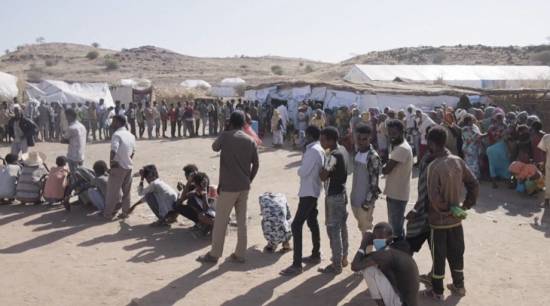Ethiopia's Tigray crisis: About 2.3 million children cut off from aid, UN says
About 2.3 million children in Ethiopia's northern Tigray region are cut off from humanitarian assistance as violence continues, the UN has warned.
"Protecting these children, many of whom are refugees and internally displaced... must be a priority", said the UN's children's agency Unicef.
Despite deals with the Ethiopian government, humanitarian agencies say they are being denied access to Tigray.
Government forces have been battling Tigray fighters since 4 November.
The government says it is in control of the region and the conflict is over. But Tigray People's Liberation Front (TPLF) says it is still fighting on various fronts.
Hundreds, even thousands, of people are thought to have been killed in the conflict, while about 50,000 have fled to neighbouring Sudan.
In a statement, Unicef said: "The longer access to [the children] is delayed, the worse their situation will become as supplies of food, including ready-to-use therapeutic food for the treatment of child malnutrition, medicines, water, fuel and other essentials run low."
It added: "We call for urgent, sustained, unconditional and impartial humanitarian access to all families in need wherever they are."
Neither the Ethiopian government nor the TPLF have commented on the issue.
What is the conflict about?
The conflict escalated in November, when Ethiopian Prime Minister Abiy Ahmed ordered a military offensive against regional forces in Tigray.
He said he did so in response to an attack on a military base housing government troops in Tigray.
media captionThe BBC’s Anne Soy reports from a refugee camp on the Sudan-Ethiopian border
The escalation came after months of feuding between Mr Abiy's government and leaders of the TPLF - the region's dominant political party.
For almost three decades, the party was at the centre of power, before it was sidelined after Mr Abiy took office in 2018 in the wake of anti-government protests.
BBC


